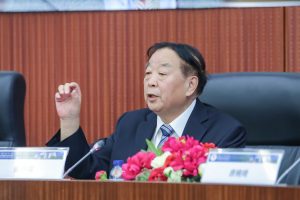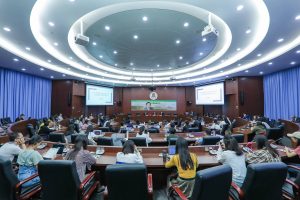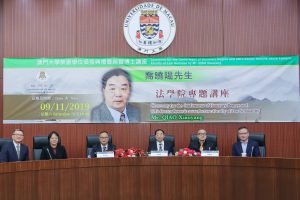Qiao Xiaoyang, honorary doctor of the University of Macau (UM), former chairman of the Legal Committee of the National People’s Congress (NPC), and chairman of the Hong Kong and Macao Basic Law Committee of the NPC Standing Committee, today (9 November) gave a lecture in UM’s Ho Yin Conference Hall. He discussed the relationship between the central government’s overall jurisdiction over Macao and the high degree of autonomy of the Macao Special Administrative Region (SAR) from three perspectives. The talk attracted many UM faculty members and students.
In his speech, UM Rector Yonghua Song said that Qiao Xiaoyang participated in or was in charge of the drafting or amending of dozens of laws, including the Amendment to the Constitution, having made a tremendous contribution to the legislation in China and the return of Hong Kong and Macao. His ties with Macao and UM go back a long way. He was involved in the central government’s authorising Macao SAR to exercise jurisdiction over the new campus, the selection of the campus site, as well as the groundbreaking ceremony and the inauguration of the new campus. Therefore, Qiao was a contributor and a key facilitator of UM’s new campus project. Rector Song added that the achievements Macao has attained over the past two decades since Macao’s return to the motherland would not have been possible without the guidance of the Constitution and the successful implementation of the Basic Law and the ‘One Country, Two Systems’ policy.
During the lecture, Qiao discussed the relationship between the central government’s overall jurisdiction over Macao and the high degree of autonomy of Macao SAR, from three perspectives, namely ‘the proposal of the central government’s overall jurisdiction over Macao and its meaning’, ‘the high degree of autonomy of Macao SAR and authorisation-related issues’, and ‘questions and answers regarding the central government’s overall jurisdiction over Macao’. Qiao pointed out that when the sovereignty over Macao was returned to China in 1999, it essentially enabled China to resume its jurisdiction over Macao. Within the ‘One Country’ framework, the central government has overall jurisdiction over all its territories, which is an important principle of the Constitution. In the case of Macao, when resuming its overall jurisdiction over Macao SAR, the central government established the ‘One Country, Two Systems’ policy and the Basic Law, which stipulate that certain powers shall be exercised directly by the organs under the central government, while certain powers shall be jointly exercised by the organs under the central government and the Macao SAR government. The central government authorised Macao SAR to manage its internal affairs that do not involve the central government or the mainland. Therefore, the high degree of autonomy enjoyed by Macao is the result of the central government’s exercising overall jurisdiction over Macao.
Qiao explained that within the ‘One Country’ framework, the relationship between the central government and the Macao SAR government in terms of power is one of authorisation. The Basic Law established a rigorous authorisation system to ensure that Macao SAR enjoys a high degree of autonomy but will under no circumstances become an independent or semi-independent political entity, in order to safeguard the country’s sovereignty, unity, and territorial integrity. The relationship between the central government’s overall jurisdiction and the SAR’s high degree of autonomy is akin to the relationship between the source of a river and the river; the two are not mutually exclusive. Therefore, whether in theory or practice, the two must never be held as opposing positions, and the high degree of autonomy must never be used to challenge or undermine the central government’s overall jurisdiction.
Reviewing the implementation of the Basic Law in Macao over the past two decades, Qiao pointed out that from the outset, the Macao SAR government and people from all walks of life in Macao correctly grasped the relationship between the central government’s overall jurisdiction and Macao SAR’s high degree of autonomy. Over the past 20 years, there has never been any instance in which the constitutional relationship between the central government and the Macao SAR government was disputed; nor has there been any instance in which the central government’s authority was publicly challenged. This fully demonstrates that Macao residents have a very strong sense of national identity and great respect for the constitution. This also shows that the academic community in Macao has done a good job of promoting the ‘One Country, Two Systems’ policy and the Basic Law in Macao; Therefore, the central government’s overall jurisdiction and the Macao SAR’s high degree of autonomy have been well integrated, demonstrating the successful implementation of the ‘One Country, Two Systems’ policy with local characteristics.
Source: Faculty of Law
Media Contact Information:
Communications Office, University of Macau
Albee Lei Tel:(853) 88228004
Kelvin U Tel:(853) 88224322
Email:prs.media@um.edu.mo
UM Website:www.um.edu.mo



